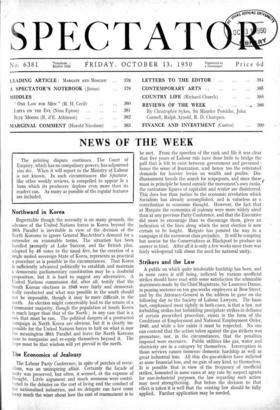The Economics of Jealousy
The Labour Party Conference, in spite of patches of reviv- alism, was an uninspiring affair. Certainly the facade of unity was preserved, but often, &seemed, at the expense of thought. Little argument and much nonsense were contri- buted to the debates on the cost of living and the conduct of the nationalised industries, and no delegate can have come away much the wiser about how the cost of rearmament is to be met. From the speeches of the rank and file it was clear that five years of Labour rule have done little to bridge the gulf that is felt to exist between government and governed ; hence the sense of frustration, and hence too the reiterated demands for heavier levies on wealth and profits. Dis- illusionment breeds the search for scapegoats, and since these r must in principle be found outside the movement's own ranks, ' the caricature figures of capitalist and rentier are disinterred. This does less than justice to the economic revolution which Socialism has already accomplished, and is valueless as a contribution to economic thought. However, the fact that at Margate the economics of jealousy were more widely aired than at any previous Party Conference, and that the Executive did more to encourage than to discourage them, gives an indication of the lines along which the next election is now certain to be fought. Margate has pointed the way to a campaign of the narrowest class prejudice. It will be tempting but unwise for the Conservatives at Blackpool to produce an answer in kind. After all it is only a few weeks since there was fairly widespread talk about the need for national unity.


















